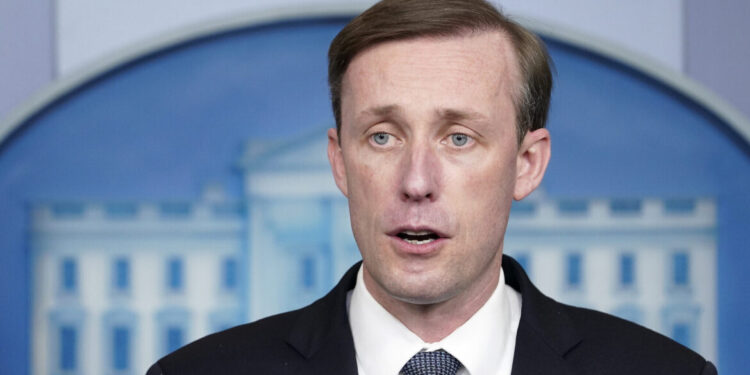Stars and Stripes report that National Security Adviser Jake Sullivan and other senior White House aides recently met with top Israeli officials. U.S. official, who requested anonymity, stated that Israel had taken U.S. humanitarian concerns into account in their planning. The official also noted that the exodus of hundreds of thousands of Palestinians from Rafah in recent weeks has mitigated concerns regarding the civilian impact of an assault.
Washington Post analyst David Ignatius has reported that Israel will forego its initial plan to deploy two divisions into Rafah, opting instead for more constrained operations. This revision follows repeated warnings from President Joe Biden that a large-scale offensive in the Gaza Strip border city, now a sanctuary for hundreds of thousands, would prompt the U.S. to cease its delivery of offensive weapons to Israel.
On Monday, Sullivan convened with Israeli officials, including opposition leader Yair Lapid, Defense Minister Yoav Gallant, and Chief of Defense Herzi Halevi, after holding discussions with Arab leaders throughout the weekend. The White House reported that Gallant and Halevi updated the U.S. delegation on “innovative strategies for overcoming Hamas in Rafah, addressing the concerns raised by the U.S. representatives.”
The Deal With Saudi Arabia and United States is Near
Additionally, the meetings covered Sullivan’s dialogue with Saudi Crown Prince Mohammed bin Salman, where they deliberated on a comprehensive Middle East agreement. This deal would lead to Saudi Arabia’s formal recognition of Israel and economic support for the Palestinians, in return for U.S. security assurances and Israel’s acknowledgment of a viable route towards Palestinian statehood.
President Biden has been pursuing a “mega-deal” to form a military alliance in the Middle East, encompassing the United States, Saudi Arabia, and Israel. The kingdom has changed a lot under bin Salman, who crushed the old Saudi religious establishment during his rise to power and now runs a much tighter ship.
“The integrated vision is a bilateral understanding between the United States and Saudi Arabia combined with normalization between Israel and Saudi Arabia, combined with meaningful steps on behalf of the Palestinian people,” Sullivan, said earlier this month. “All of that has to come together…you can’t disentangle one piece from the others.”
Senior Pentagon officials met with Arab military leaders in Riyadh last week to discuss the expansion of emerging Middle East air and naval defense alliances, aiming to eventually counter Iran’s missile and drone superiority over neighboring countries.
Dan Shapiro, the senior Middle East policy official of the department, is leading the discussions with military representatives from all five nations of the Gulf Cooperation Council. The dialogues are a segment of the second annual defense working group meetings taking place in Saudi Arabia’s capital, in conjunction with officials from CENTCOM and the Joint Staff.
Iran’s unprecedented aerial assault, involving over 300 drones and ballistic missiles launched towards Israel on April 13, instilled “newfound urgency” in discussions and was ultimately effective in fostering deeper cooperation among allies, a senior US defense official reported to the media. Approximately 99% of the Iranian projectiles launched were intercepted by Israeli air defenses and aircraft, or by US, UK, French, and Jordanian fighter pilots, with intelligence support from Saudi Arabia and the United Arab Emirates or failed to reach their intended targets in Israel.
Earlier this week, a significant development occurred as the United States and Kuwait signed a new radar data-sharing agreement. According to US officials, other Gulf states are also pursuing specific early warning systems to integrate into their air and missile defense networks.
As the conflict’s expansion is largely curtailed, the US administration is intensifying efforts to bolster regional defenses to counterbalance Iran’s advantage. Concurrently, it engages in diplomacy to prevent escalations that might prompt Iranian leaders to pursue nuclear armament. Meanwhile, Israel has the chance to emerge from its conflict with Hamas as a key figure in a collaborative Middle East, united in mitigating Iran and its affiliates.
Jim Williams covers the conflict between Israel and Hamas, offering comprehensive written articles and video coverage on various Middle Eastern issues.
Washington based CEO & Founder of LJC. Media covering politics, sports, & entertainment A seven-time Emmy Award-winning TV producer, director, and podcast host. Digital Director and Washington Bureau Chief at News Talk Florida & The Daily Cable

































































